‘I felt seen’: meet the first #QueerAdFolk contributors
Queer Ad Folk is a project in partnership with Outvertising created to shine a light on LGBT+ talent in the advertising industry in order to help up-and-comers see people like themselves thriving. Here, its creators John Osborne and Oli Rimoldi introduce the first ‘#QueerAdFolk’ contributors featured in the series.
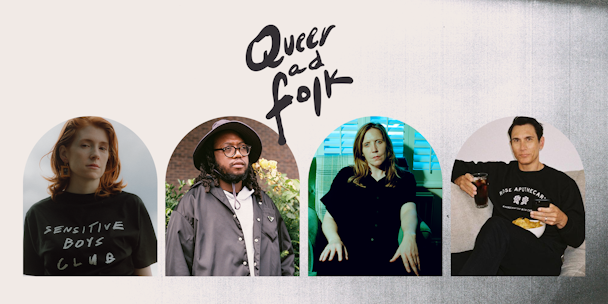
John Osborne and Oli Rimoldi introduce the first ‘#QueerAdFolk’ in the project
Well, here we are. Two creatives put their producer hats on and launched a project to leave the industry a bit better – and queerer – than they found it. And we did it with the help of many talented and generous people.
Over the coming weeks, we will showcase some of the industry’s top ‘Queer Ad Folk’, with chats hosted by us two, and portraits shot by incredible queer photographers. All designed by Luke O’Prey, with our logo created by Oded Shein.
And so without further ado, let’s meet Grace Francis, Peter Robertson, Karen Crum and Kevin Morosky. For more chitchat, check out our Instagram @QueerAdFolk.
Grace Francis, chief experience officer, Karmarama
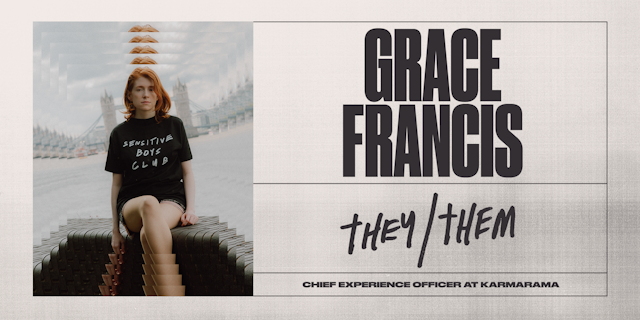
Have you always been ‘out’ at work?
“I spent my early career certain that I had to fit in. Everything from accent to achievements had to be carefully curated so I would be accepted. It took decades to realize that I could share my sexuality and gender identity.
“It was going into leadership that made me realize I wanted to be out all of the time, and that really is a duty to show others like me that we exist in the industry.”
Does being LGBT+ help you in your job?
“Yes – it lets people know that they are meeting an authentic person who isn’t afraid of showing vulnerability. This means people of all identities can extend that same openness to me.”
Would you say that advertising is open-minded?
“Like any industry, we are just a group of people made up of members of society. Some of them are open-minded, some not. Open-mindedness is nothing without diversity and we know our industry is not diverse.”
Any LGBT+-inclusive ads that you think are great?
“I’m most excited by creative agencies extending beyond ads to make an impact for the LGBT+ community. Work like McCann New York’s True Name for MasterCard feels absolutely incredible.
“I got to award this work as a judge at the OneShow and later present an award to the creatives behind the idea – Pierre Lipton, who is a cisgender man, and Lucas Crigley, who is a transgender man.
“I was so disarmed by how freeing and beautiful it was to connect in that moment with another transgender person in our industry, especially when he was responsible for such an important piece of work. I didn’t know how badly I needed that until I experienced it. I hoped he felt seen – I felt seen.”
What advice would you give brands making Pride content?
“I’m going to assume that brands have good intent when creating Pride content – and I think lots of brands do have good intentions.
“For me, it has to be about intersectionality. Queer people are also people of color, they are also disabled people or neurodivergent people. Show us holistically.
“And, you know, hire queer people and have them lead the work.”
Peter Robertson, executive creative director international, Mother
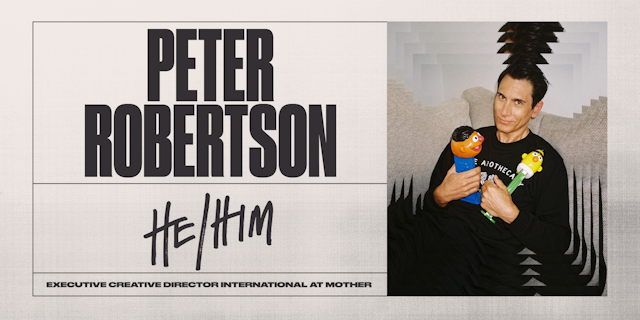
Have you always been ‘out’ at work?
“In New Zealand, I wasn’t out, in life or at work. I made the decision to come out when I moved to the UK about 20 years ago. I thought it would be easier to start a new life in a new country. It didn’t even occur to me whether at that point I’d be out in my personal life and not at work. It was either all in or all out.”
Does being LGBT+ help you in your job?
“Well, yeah, probably. Because it helps me look at things differently. But so does being from New Zealand. Or being one of the older ones in the room. It’s everything. It’s the combination of all these things that makes me look at things differently. That’s why diversity is so important. Different people bring new ideas and new experiences, and that theoretically leads to more creative solutions.
“In New Zealand, virtually every brief was either for a beer brand or a rugby brand – or a beer brand sponsoring a rugby brand – and I had no interest in any of that. Beyond looking at the pictures of some of the cute All Blacks. But the upside of that situation was that it gave me a different way of looking at the brief and, consequently, the work was fresher.”
Have you experienced LGBT+-phobia at work?
“I think, more than anything, I had a LGBT+-phobia that I’d put on myself. I was really aware of it. Little Britain was very popular at the time, and I was literally the only gay in the village... and I remember feeling like that all the time. Mother would have trips away and I’d be like, ‘Which guy should I share a room with? Will they think I’m hitting on them?’ Just stupid things that would play on my mind.
“On the other end of the spectrum, we pitched overseas once and afterward we got some off-the-record feedback that one of the clients had said that they thought we had ‘too many women in power’, ‘too many foreign voices’ and ‘possibly a couple of gays’ in the room. And I was floored – we all were. Now that almost certainly wasn’t the only reason we lost the pitch, and yet I couldn’t help sitting there afterward blaming myself for being the person that I was. As if I’d let down the rest of the team. We can be overly hard on ourselves. Instead, I should have been thanking myself that we didn’t have to work with clients like that.”
What’s the best way for colleagues to be good allies?
“If we’ve learned anything over the past couple of years, it’s that everyone needs to be an ally to everybody, right? It doesn’t just rest on the gay person in the room to make that call. One of the things that Mother is doing is setting a panel of people from different minority groups that look at our work and give an honest opinion about it to make sure we are being representative and showing communities in the right light.
“One of the things that has always stuck in my mind is that in your enthusiasm to show support, don’t assume that everybody wants to talk openly about their sexuality. When I first started at one agency, I was cornered by this girl in the pub and she was asking me pretty aggressively about my sexuality. And I’d only come out three months earlier. I was still coming to terms with myself. And that’s an example of someone who wasn’t being a good ally because her questioning wasn’t supporting me in any way. She just wanted to be the person that uncovered ‘the gay’.”
Any words of wisdom for queer newcomers to the industry?
“Hurry up! Hurry up and get in here because we need you. We need everybody to have a voice. And I don’t think I have any more advice except that know that you will be welcomed. At least, I certainly hope you will be!”
Karen Crum, SVP, global brand strategy director, McCann
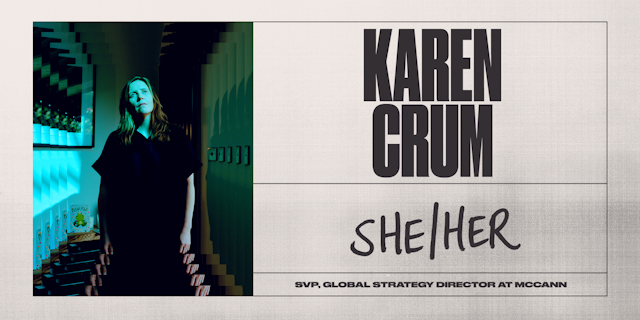
Have you always been ‘out’ at work?
“No, no. I also wasn’t out to myself. My brother joked that it took me a long time to ‘get my groove on’. I grew up in Northern Ireland, and at the time in that environment, you just aren’t gay so any thought that I might’ve been wasn’t allowed to the surface.
It took me moving to England for it to start entering my head. At Ogilvy, my first chief strategy officer (CSO) was a gay woman, so I was around people who were out and were very comfortable about it at work. But I wasn’t. It took me some time, and I kind of came out at work which was OK…but awful at the same time. Mainly because it’s a baffling thing to have to say: 'Hi, here’s who I like having sex with, everyone cool with that?'. No one else has to do that. I’m quite a private person, so it took me a bit of time.”
Does being LGBT+ help you in your job?
“I think a lot of people who have been ‘the other’ are very good at having empathy. For me, that is really helpful. Human brains are designed to make everything black and white. It’s all very binary.
“But I think the world is a lot more powerful when you look for the grey, and what unites us or pulls us together. If you have experience of being left out or having different opinions about yourself, or you don’t quite exist in a space, I think your brain more naturally looks for the grey. And maybe it was part of what made me become a strategist.”
Have there been any LGBT+ people in adland who inspire you?
“Lots of people, particularly at McCann now. I’ve always been very lucky to have ‘out’ leaders around me. People who are exceptionally good at what they do, who just happen to be gay.
“From my first boss to my current boss. Again, it’s why it’s so important to see someone that looks or feels a bit like you, being really good at what they do. That it’s ok to bring your whole self to work, and not have to hide who you are. So there’s no barrier in your mind.”
Have you experienced LGBT+-phobia at work?
“I think the hardest bit is that you still feel like the odd one out. And you have to explain the difference quite a lot. I don’t think there’s been a bad incident. I’m at a company that’s so welcoming. I’ve never felt anything but love at McCann. But sometimes in large meetings, or when meeting people for the first time, everyone’s story is very heteronormative and you feel awkward.
“There’s an assumption your partner is a man, and you have that moment when you say ‘she’ and you have to come out again. Because deep down, I still think I may be judged for being gay. I know it’s such a ridiculous fear, but you can’t totally remove from your brain the background noise from the world outside of work, because homophobia very much exists. So it can be quite a tough thing to internally process, in those moments.”
Any words of wisdom for queer newcomers to the industry?
“The sooner you can get to being yourself, the better it is because the sooner you’ll be relaxed and feel that you belong. It’s really hard to feel good about what you’re doing or feel you can be a success in anything if you’re not really being who you are. You don’t have to hide that. My advice would be to not rush to make decisions, but don’t hide who you are.”
Kevin Morosky, chief creative officer, Pocc
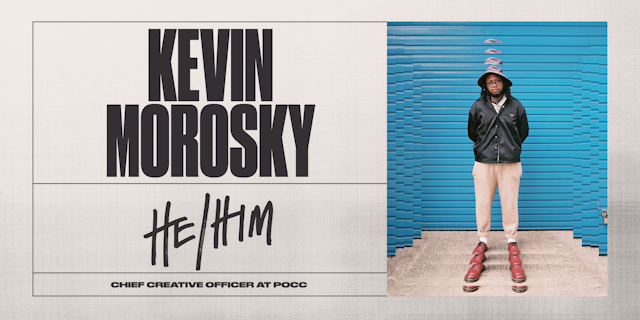
Have you always been ‘out’ at work?
“Listen, I’m from Croydon. For the most part, when it comes to me being gay, I was really busy being Black. I didn’t have time for homophobia, I had a whole government growing up trying to literally ruin and displace my culture. I’ve been out since I was 14/15, but I just didn’t have time for it. It’s like, yes, I’m gay, now I’ve got to fight this other battle. So when it comes to advertising... yeah, I’ve always been out.”
Does being LGBT+ help you in your job?
“I think my queerness, me being gay, allows me to tap into my feminine side and find an equal footing more easily than I’d say my straight counterparts do. Low key, women are literally the universe and hold everything up. They are making everything spin. And women, specifically Black and brown women, are my number one concern. In any space.”
Have you experienced LGBT+-phobia at work?
“Yeah, 100%. And I was always made out to be the bad guy, because as soon as I experienced it, I said it out loud. Growing up in Croydon, I think it’s always allowed me to compare it to anything else that I come up against. Advertising isn’t Croydon, you know what I mean? I’m just like – I can’t be bullied, and I can’t be pushed out. When you take a kid like me and put me in that situation, I can’t be intimidated like that.”
What’s the best way for colleagues to be good allies?
“It’s the same thing I say about representation in terms of race. You can run around saying you need diverse talent, you bring them in – but then there’s no one in senior management that speaks that language or is from that culture or shares that lived experience. We need more queer people in all levels of the organization.
“With my creative partner Tom – god bless Tom – there are so many wild things that have been said to me, and I haven’t even had to look up from my laptop because he’s just gone off. Not having it, and made a scene. I didn’t even have to lift a finger. That kind of support has been invaluable for my mental health, because I know he’s always there and will always listen.”
What advice would you give brands making Pride content?
“Yeah, I don’t believe you. Just donate the money. You’re just trying to sell products and it’s gross. It’s really boring. Pride is really commercialized. It’s unrecognizable and that’s a shame. Do not get me wrong, it’s not that there aren’t ways that brands can get involved. I want to see that energy all year round. If you’re worth billions, you can afford it.
“It’s the same thing I say around Black History Month and those things. Just hand over the money for us to go off and make things in the way that we need to make them.”
Big thanks to Francis, Robertson, Crum and Morosky for taking the time to get involved. If you’d like to get involved or know someone we should be featuring, slide into the DMs @QueerAdFolk or email us at queeradfolk@gmail.com. Tune in next week for more Queer Ad Folk.
Co-founders of Queer Ad Folk, John Osborne is a senior creative at Creature while Oli Rimoldi is creative director at Mother.
